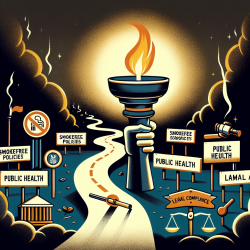Introduction
As a Special Education Director, the responsibility to ensure a safe and healthy environment for students is paramount. While the focus often lies on educational and developmental needs, the broader health policies, such as smokefree environments, play a crucial role in safeguarding the well-being of students and staff alike. Drawing insights from the research article "Smokefree Policies in Latin America and the Caribbean: Making Progress," we can glean valuable lessons for practitioners in educational settings.
The Impact of Smokefree Policies
The adoption of the World Health Organization's Framework Convention on Tobacco Control (FCTC) in 2005 marked a significant shift in public health policy in Latin America and the Caribbean (LAC). The research highlights the progress made in implementing smokefree policies across the region, protecting millions from the dangers of secondhand smoke. For practitioners, understanding these advancements is crucial in advocating for similar measures within their institutions.
Key Lessons for Practitioners
- Advocacy and Collaboration: The success of smokefree policies in LAC was largely due to the collaboration between professional advocacy groups, government bodies, and civil society. Practitioners can take a cue from this model by fostering partnerships with health organizations and community groups to promote smokefree environments in schools.
- Legal Framework and Compliance: Ensuring legal compliance is a core responsibility for any educational leader. The research underscores the importance of robust legal frameworks that support smokefree policies. Practitioners should familiarize themselves with local and national legislation to effectively implement and enforce smokefree policies within their districts.
- Overcoming Challenges: The tobacco industry's opposition remains a significant hurdle. However, the research shows that persistent advocacy and legal action can overcome these challenges. Practitioners must be prepared to engage in policy discussions and advocate for the health rights of their students and staff.
Encouraging Further Research
The research paper provides a comprehensive overview of smokefree policy implementation and the associated challenges. Practitioners are encouraged to delve deeper into this research to understand the nuanced strategies that led to successful policy adoption. Engaging with such research can enhance their ability to advocate for and implement effective health policies in their schools.
Conclusion
Creating a smokefree environment is not just about compliance; it's about ensuring a healthier future for our students and staff. By learning from the successes and challenges of smokefree policies in Latin America and the Caribbean, practitioners can be better equipped to lead similar initiatives within their own districts. For those interested in exploring this topic further, the original research paper offers a wealth of information and can be accessed through the following link: Smokefree Policies in Latin America and the Caribbean: Making Progress.










